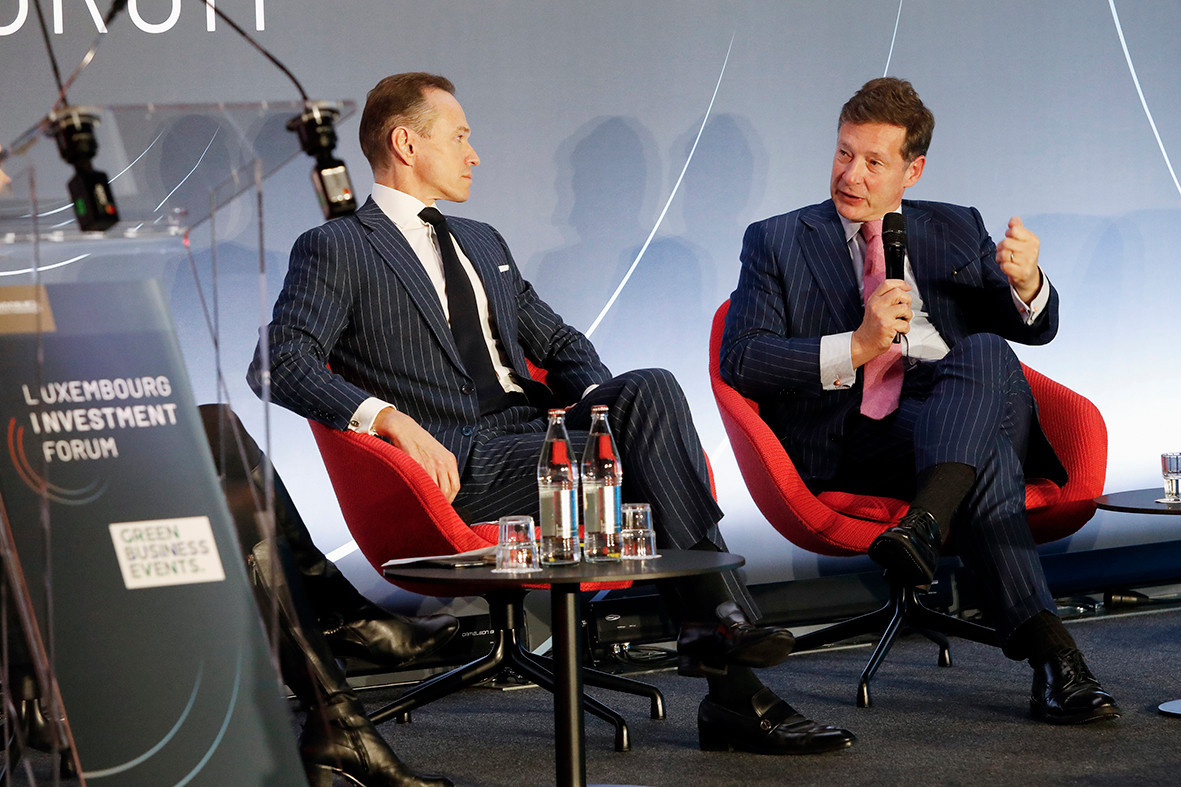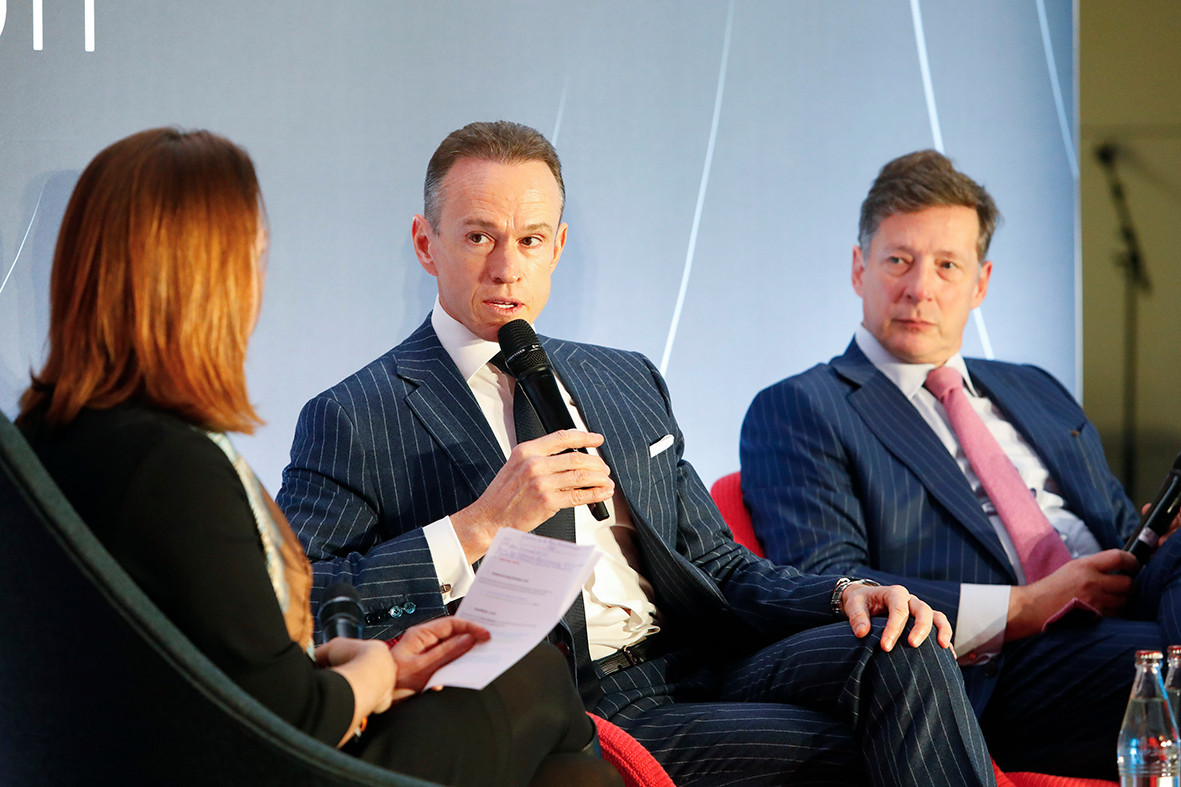Looking back over the last 10 years, Luxembourg’s financial centre has “redefined, reinvented itself and developed new activities,” said Luxembourg for Finance CEO during a panel dedicated to the country’s future at Indosuez’s Luxembourg Investment Forum on 27 November 2023 in Kirchberg. Banking secrecy ended a decade ago and, despite this, private banking has “developed very, very well” since then. This is thanks to the country’s triple-A rating, its stability and its “toolbox” for investment funds, which Mackel called the “backbone” of the financial centre.
Not only that, the grand duchy has also become a pioneer in sectors like green finance--such as in terms of green bonds that are listed on the Luxembourg Stock Exchange--digitalisation and tokenisation, added Mackel.
Why has Luxembourg been so successful?
For Luxembourg Stock Exchange chairman , the resilience and success of Luxembourg’s financial centre can be illustrated with two examples: the growth of private equity and the arrival of the Industrial and Commercial Bank of China (ICBC), the biggest bank in the world by total assets, in Luxembourg.
Twenty years ago, the country had 30 private equity firms. Now there are thousands. But this development didn’t start from zero, noted Kinsch. There were already, since the 1980s, structures called “acquisitions intracommunautaires” (or intra-community acquisitions). If an Anglo-Saxon fund, for example, wanted to buy a German company, they’d pass by a Luxembourg structure. “So big actors were already present in Luxembourg.”
To attract more firms to the grand duchy, players in the financial centre got together and asked: If you had a blank page, what would the ideal fund look like? The regulator, the government and private actors like the Big 4, law firms and private equity investors “picked up the pencil” and set up a law on investment companies in risk capital (Sicar) in 2004.
This was good, but not enough. So new laws followed, continued Kinsch, such as one on specialised investment funds (Sif) in 2007 and one on Luxembourg limited partnerships in 2016. “There is this continuous innovation that listens to the market,” he said, highlighting the differences between Luxembourg and other countries.
For me, the keyword is resilience
Kinsch took the example of the arrival of the ICBC as his second example. Once the Chinese government decided that Chinese banks could set up subsidiaries outside the country, there was a “beauty contest” between Amsterdam, London, Frankfurt and Luxembourg. And Luxembourg “won,” he said, pointing to ICBC’s establishment in the grand duchy. Today, there are six Chinese banks in Luxembourg. How did this happen?
There were three reasons, explained Kinsch, referring to what the ICBC chairman told him when he came to the grand duchy: the fact that the government was “very available”; a “strong, open, pragmatic and fast regulator”; and Luxembourg’s “friendship.” “Luxembourg has always tried to be a country that does not lecture others, but that respects other countries,” said Kinsch.
Post-Brexit, financial giants also came to Luxembourg for similar reasons, added Mackel, pointing to the arrival of private banks like JP Morgan, Citi, HSBC, fund activities and insurance companies such as AIG.
How competitiveness can be maintained
Competitiveness was “at the heart” of the recent election campaigns, noted moderator , head of wealth management Luxembourg at Indosuez, with a focus on topics like cost of living and inflation. How can Luxembourg remain competitive?
It’s not just economic challenges, replied Mackel. Other issues, like geopolitical tensions, also play a role. Following the start of Russia’s full-scale invasion of Ukraine in February 2022, for instance, assets under management in Luxembourg funds dropped by around €850bn. But the financial centre has been “resilient” and has done a good job in “resisting pressure.”
Read also
“For me, the keyword is resilience,” said Mackel. Everybody is confronted with the same problems and pressures: what differs is how we respond--and how quickly. It will be key to react with “agility,” he added, noting his hope that Luxembourg’s newly installed government will continue to do so.
Kinsch emphasised the importance of developing activities all across the value chain: not just back-office or middle-office tasks. Bringing front-office activities, such as dealmaking and investor relations, to the grand duchy will help the country become less dependent on back- and middle-office activities, and--more importantly--attract “decision-makers” to Luxembourg.
Read also
It will also be crucial to take a position on current and future themes, added Kinsch. There’s artificial intelligence, of course, but Luxembourg has also established itself as a key player in the ESG and sustainable finance space, with its green bonds, green stock exchange, and .
Talent: “number one problem”
“Talent attraction has become--we’re not going to hide it--the number one problem of our economy in general, and the financial centre in particular,” said Mackel. The issue is due to Luxembourg’s positive “quantitative” and “qualitative” development: not only is it now necessary to attract people in terms of numbers, but these profiles also need to be “sophisticated.”
Mackel again referred to the newly installed government and its , which includes several “strategic” measures to tackle these issues, such as tax credits and the establishment of a high committee for talent attraction.

Alain Kinsch and Nicolas Mackel discussed how Luxembourg’s centre has evolved, competitiveness, talent attraction and the grand duchy’s economic model during a panel moderated by Sandrine Pompidou, 27 November 2023. Photo: Indosuez/Olivier Minaire Photography
No one comes to the grand duchy for the mountains, sea or lakes, he added. “But for families with young children, Luxembourg is a paradise,” with its quality of life, cultural offer, security and international character.
Will Luxembourg’s economic model change?
Luxembourg’s economy is “very dependent” on its financial centre, noted Pompidou. Is its “diversification and re-industrialisation” inevitable? Will its economic model shift in the coming years?
“First of all, I would say that there is nothing wrong with continuing to help the financial centre grow,” replied Kinsch. That’s a good thing.
We can still be innovative and produce products with added value
Second of all, just a few years ago, there was nothing in Kirchberg, he added, just a Ford garage, a pool and fields. Luxembourg, in the past, was a very poor country that became rich thanks to its mining and steel industry--buildings like New York’s One World Trade Centre use steel produced in Differdange, while Dubai’s Burj Khalifa has glass from Dudelange.
Moreover, industry in Luxembourg still exists--and is flourishing, argued Kinsch, using as an example. “We can still be innovative and produce products with added value,” he said.
“Enlarge the cake”
“The financial industry must continue to develop,” Mackel concluded, addressing Pompidou’s final question on the ambitions for the financial centre. This shouldn’t be at the expense or exclusion of other sectors; instead, “we have to enlarge the cake.” “We should not decide to do less of this or that--what are we going to less of, sustainable finance? Not at all. We have no intention of doing less; on the contrary, we will do more.”
“We have a lot of hope in the new government, that they understand this message,” said Mackel. “It’s good for Luxembourg--it generates a lot of revenue.” But it also has a positive impact beyond Luxembourg’s borders by supporting economic development elsewhere.


